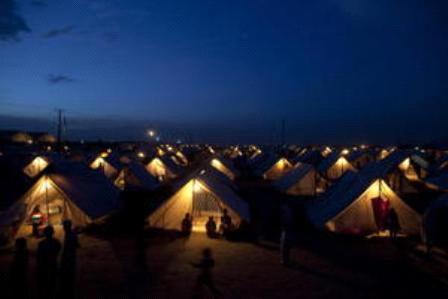Ammon News - GULFNEWS
Jordan’s foreign minister has dismissed claims that the Gulf Cooperation Council (GCC) has tied its financial assistance to the kingdom with pre-conditions.
Reacting to a query whether any precondition has been imposed on Amman for the assistance, such as accepting all the Palestinians from Syria to settle in Jordan, Nasser Judeh said that he was not aware of the claim.
“The GCC has always stood by Jordan and it will continue to do so. This is much appreciated,” Judeh said. “But are there conditions or strings attached? I do not know where this notion of accepting Palestinians coming in from Syria or Iraq came from. It certainly is not on the table. It was never asked of us. I think Jordan’s credentials in hosting the largest number of Palestinian refugees and other waves of refugees are well known,” he said at a session at the Manama Dialogue.
The GCC last year announced plans to fund a five-year development aid programme for Jordan and Morocco.
Judeh said that Jordan and the GCC were in “serious discussions now to elevate the status of the already excellent relationship with the countries of the GCC to strategic cooperation and strategic partnership.”
“We have had meetings and there are committees being formed in different sectors to follow up on that, taking across the board issues like the economy, legal affairs, cultural cooperation, trade and more,” the foreign minister said.
“As a result of this initiative in the last year, we have had an announcement by the GCC countries to allocate $5 billion over five years to support project development in Jordan. We are now receiving the first annual instalment in this context. This is, of course, something that will help us a great deal.”
Judeh said that Jordan was facing serious economic challenges and that it fully appreciated the GCC stance.
The foreign minister, in a response to the number of cabinets he expects Jordan to have in 2013, admitted that Amman has had frequent changes of governments, but added that it was a traditional aspect of the country.
“How many Jordanian governments will we see in 2013? I cannot tell you, but we have a constitution and we follow the letter of the constitution,” he said. “I think this is very much an essential component of democracy. Yes, we have frequent changes of government in Jordan. This has always been a traditional aspect to Jordan and our reputation is well-deserved. However, if you recall, the new changes to our constitution require that when Parliament is dissolved the government of the day resigns. This is what happened in the last month. Before that there was a government that almost had to face a vote of no confidence in Parliament and resign. This is part of a vibrant democratic process. I think the measure of how progressive the Jordanian reform programme – which, again, is led from the top – is not the frequency of governments; it is the achievements on the ground,” Judeh said.
The minister said that people should appreciate the significance of the changes introduced by Jordan in the last two years.
“I do not want to say that we pre-empted the Arab Spring by embarking on a political, economic and social reform programme way before the Arab Spring, but in the last two years we have changed one-third of our constitution,” he said. “It takes a lot of confidence to do that in our part of the world. We have enacted laws. We have set up the constitutional institutions like the independent elections commission, which does not report to the judiciary, Parliament or government. It is totally independent. It sets the date of the elections; it oversees and conducts the elections. Our government, judiciary and Parliament have nothing to do with elections anymore. We are going to have elections.”
“Look at the chronology: one-third of the constitution is changed; the laws are enacted; the institutions are set up; then we have elections, which will happen on 23 January. It has been made very clear that this is the beginning of Parliamentary government. This is the beginning of four year term governments. We are heading in the right direction. Again, do not measure us on the frequency of our governments, but by our achievements on the ground,” Judeh said.
